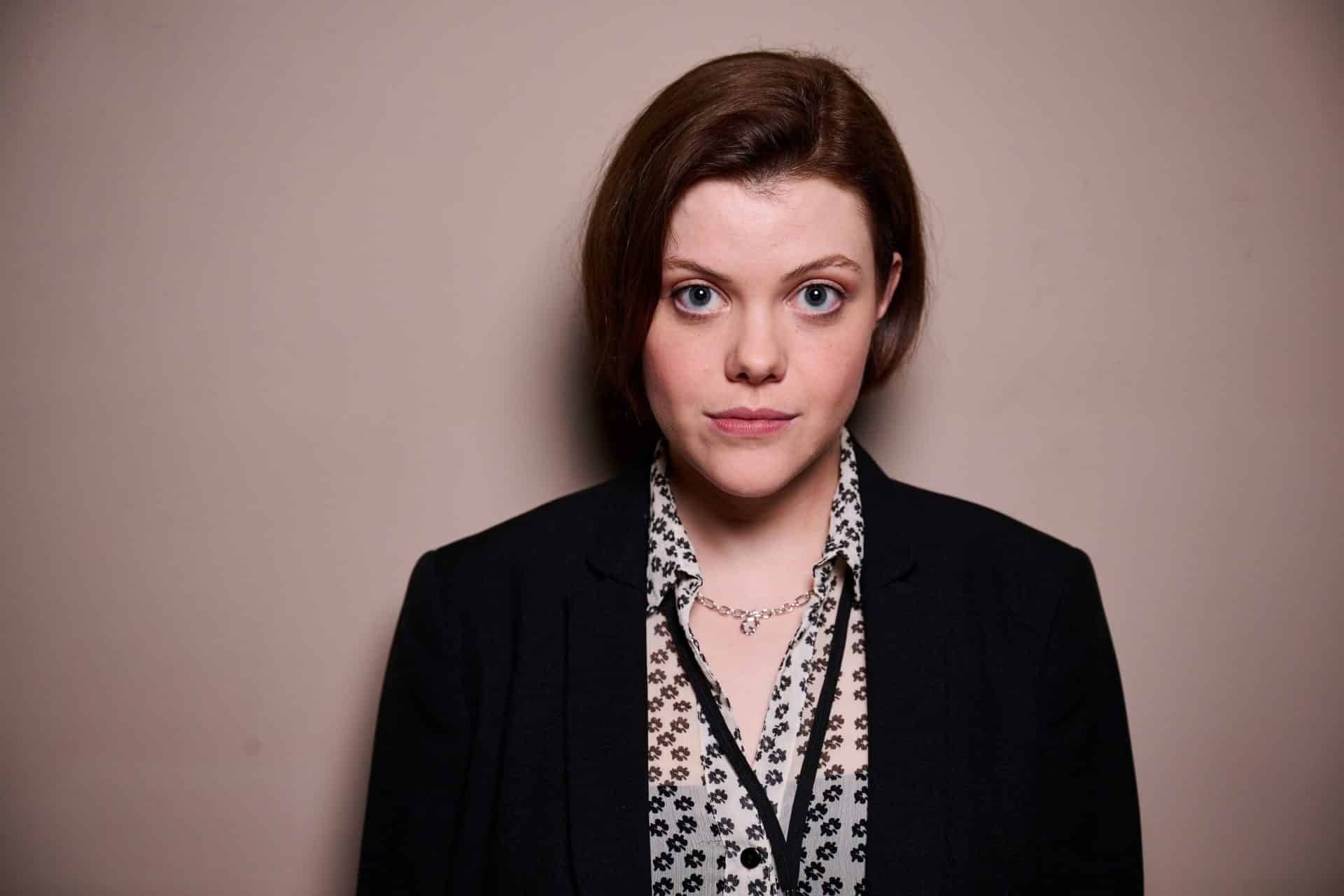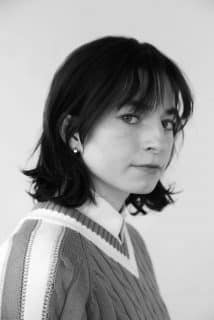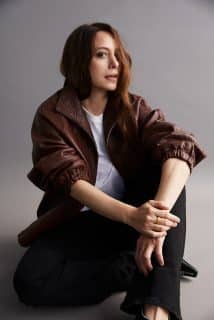Georgie Henley on Partygate
Culture
Partygate is one of the watches of the year - lead Georgie Henley tells us about this shocking indictment of the Number 10 pandemic booze-ups
Partygate is one of those TV shows that is meant for communal viewing – it is a must-watch, yet not necessarily in the fun, escapist sense. It is instead a gripping docudrama about, of course, the scandal involving the parties at Number 10 during the pandemic. Dramatisations of the real-life events in Downing Street, which have been taken from Sue Gray’s report, are juxtaposed with documentary footage of people around the country trying to nobly abide by the rules and survive. It is a shocking watch, a reminder of how things played out for all of us – the fear and the togetherness – contrasted with rank hypocrisy and nauseating entitlement of the party people at the heart of government. Georgie Henley is the lead of the show, playing Grace, a fictionalised special advisor, who is something of an outsider who grows increasingly uneasy with what she sees. We managed to speak to Georgie about Partygate and found a very impassioned and engaging person who knows this programme has the ability to galvanise change. Georgie rose to fame as Lucy in the Chronicles of Narnia films, and is now building a heck of a career with her adult roles. Enjoy our deep dive with her into Partygate…
Can you just tell us about Partygate firstly?
It’s a docudrama, a kind of reckoning with what happened in Number 10 during Lockdown, mainly focusing on the illegal parties that happened. We are following a fictional group, but they’re based on an amalgamation of people who were special advisors at the time. My character is one of those fictional special advisors who is a bit more on the fringes of everything and has a different reaction to what’s happening, and isn’t able to be as comfortable with it as everyone else seems to be. It’s based on the Sue Gray report about that inquiry.
Were you doing lots of research into it all?
Yeah, the script is really forensically structured. But it was a lot to get my head around. For all of us, really, because, first of all, I think we’ve all tried to pretend that that didn’t happen. As in, the pandemic was so difficult for everyone, and we’ve all tried to get back to some sense of normality. So even just getting back into the headspace of that time was really mad, actually – when every time you turned on the news, there was a new report on how many people were dying and new restrictions.
So that was one challenge, and then the other part was we depict 14 parties in the show and we had to get our heads around the chronology of what was happening at the time in the country. We were contextualising it, which I think is one of the strengths of the program: this juxtaposition of what’s happening within Number 10 and what’s happening in the wider country. It’s one thing to read the script, it’s another thing to see it with the archival footage alongside what we shot. I personally think it’s quite a feat in itself to achieve what it does achieve.
We had an amazing team. Joe Bullman, who directed and wrote it, is just incredible. They recommended me a great book by Deborah Mattinson called Beyond the Red Wall, which is basically about the people who had voted Labour their whole lives and then decided to vote for the Conservatives in the 2019 election. It was quite a big upset how that happened and it looks at why particularly Northerners – and my character is Northern – felt that there were certain parts of the country that had been neglected, and what their thoughts were on Boris, which was fascinating.
Then there was one more book, which my dad recommended to me a few months before. It’s by Fiona Hill, who is one of the leading foreign policy advisors in the US. She grew up in the north of England, and was from a working class family – it’s called There Is Nothing for You Here, which is something that her dad said to her when she was younger. She basically talks about feeling like an outsider in those kind of situations, at Harvard and then at the US political office. It’s that idea that it’s such a tragedy that your class and the geography of where you’re born end up entirely dictating the course of your life and your future. She talks about how she would have assumed that things would be different now, but she says it’s still so similar from when she was a teenager to now because there’s such a lack of social mobility.
So yes, lots of research because it means a lot to people. It’s a real hot button topic and it should be.
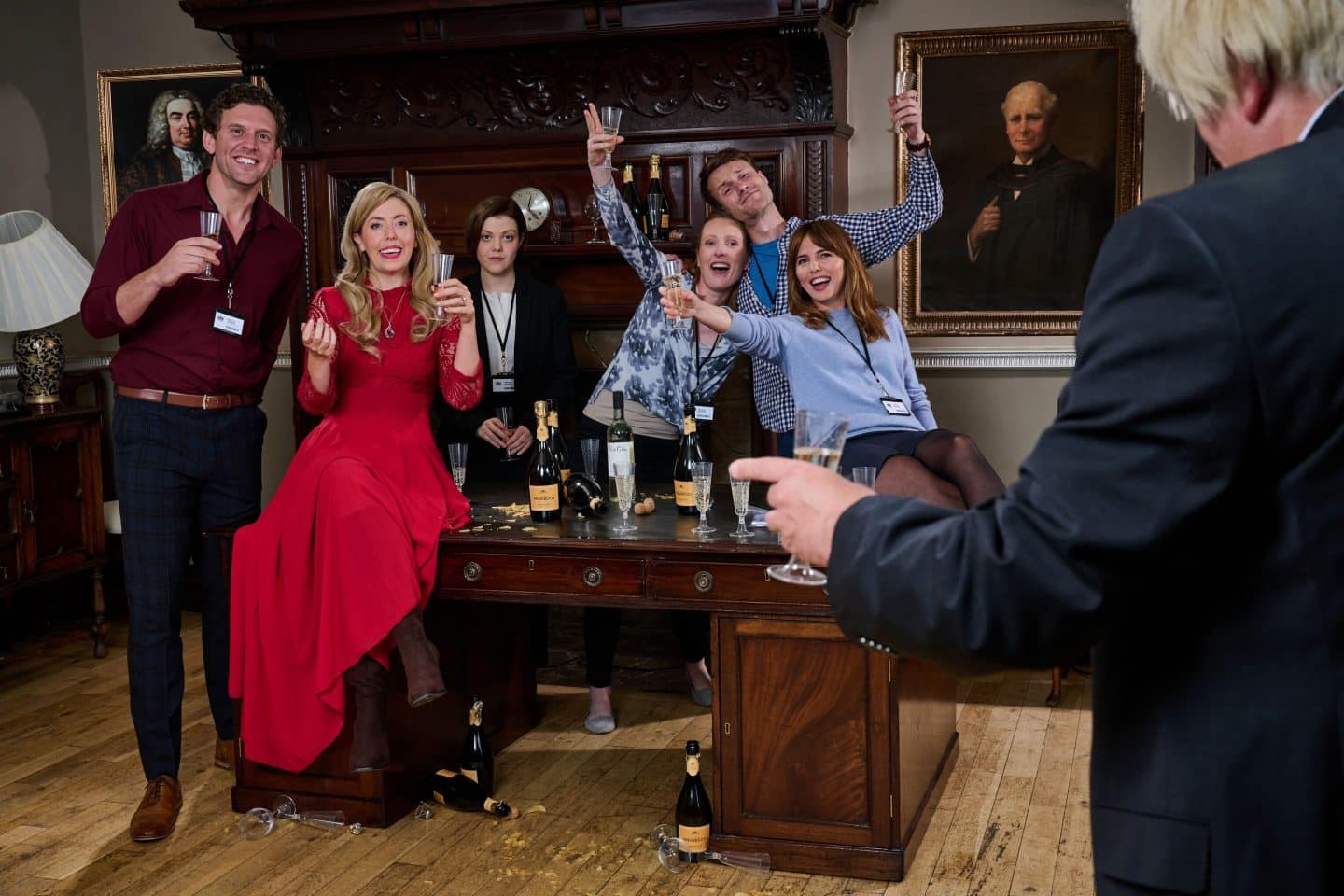
It does completely take you back. Like just how long they waited before the first lockdown.
I think it was really traumatic for everyone, a collective trauma. Obviously we all had our own experiences, but we were also experiencing something en masse. When I went in to do my voiceover, I watched the first ten minutes of the archival stuff and I felt like I was time traveling. I honestly felt like I had gone back in time and it’s a wild feeling.
What was your lockdown like?
It was difficult, like it was difficult for everyone. I lived on my own, so that was hard. I bubbled with a friend when I could because she lived on her own as well but before that, it wasn’t an option and it was very difficult. I was really happy when the vaccine became available – there’s a food bank around the corner that I volunteered at and that was turned into a vaccine site. My industry had been entirely put on hold, so I was at the vaccine site all day helping with that. That was an amazing thing to witness because we started with giving it to people who were really old and not very well and vulnerable. It felt like felt, okay, we’re finally doing something that is going to hopefully change the situation that we’ve been in. And this is the start of the future and the start of hope. I really feel like with lockdown, we all had to grin and bear it, and we knew that we were all doing the right thing, but it doesn’t mean it’s less difficult.
But I think that spirit that you’re talking about, that’s why the show really hits home, because in the archival footage there’s so many people who want to do the right thing, who wanted to obey the rules and do their little bit to help in whatever way they could. Meanwhile, in Number 10…it’s just so shocking. You just can’t believe it.
I think that’s really what it is. The way we talked about it when we were filming was it was like this national sacrifice. It was not easy for people, but it was something that they wanted to do because it was the right thing to do. The interesting thing about the show is that it’s one thing to read something in a report or in a newspaper, but it is a whole other kettle of fish to actually watch it.
Yes, definitely.
Even I don’t think I was prepared for that. There were two scenes when we were filming which, when I read them, I knew that they would be difficult to film, but actually doing it and acting it out, I was like, ‘I feel nauseous. I feel sick to my stomach’. Because it was something that really did happen. The scenes were when the wine fridge comes in – it’s a very small scene, but it felt so insidious, especially because it was around Christmas time. It showed a level of premeditation. And the other scene was the scene with Michael Port, who comes and breaks up the Christmas party. I don’t want to spoil anything, but he is humiliated. When we were doing that, it felt too real.
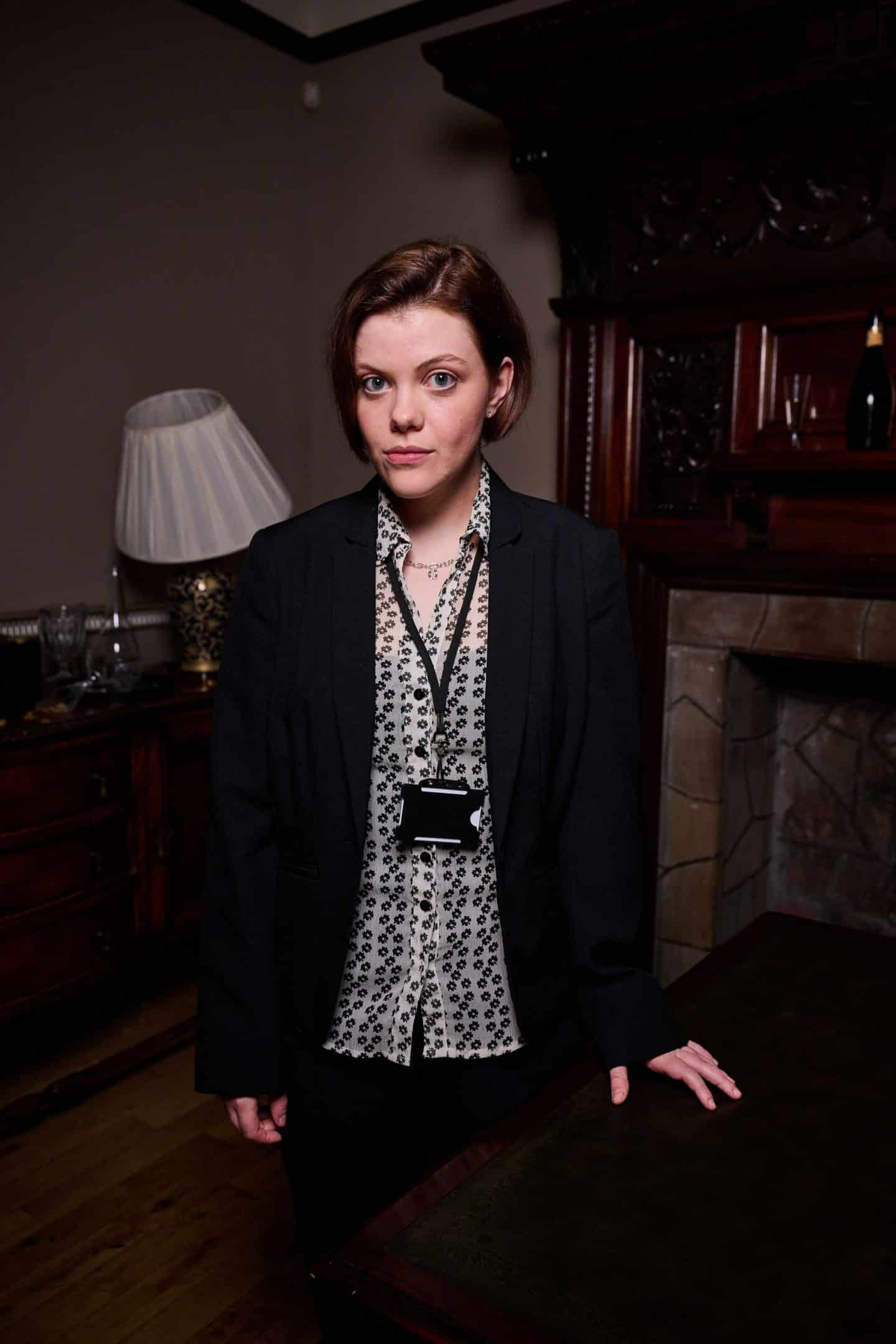
Where did you shoot it?
We were in a huge old house. The art department did an amazing job. I think because we were just in this house, it felt like we were in some weird summer camp. We all went a bit mad for the first week. We did a lot of office stuff. But the second week was mainly the parties. For the supporting artists, they were partying – having a dance or having a chinwag with glasses, like fake wine – but doing that all day for five days. It’s a weird thing to be in this eternal party in a house in the height of summer.
But we were also dealing with this harrowing material. We were all sharing this little green room, and we’d come into it and be like, this is so bizarre. Our crew was amazing, every single member of the cast. We had a lot to get through challenging stuff to shoot, and it really felt like we were such a company.
Presumably you weren’t improvising or anything. It was all quite tightly scripted?
I’d say that a lot of it was improv. Yeah. The script was very forensic, and it was written, obviously, with anything that was reported to be said. Anything that had been confirmed to be said that had to be in there. But we would do a take of the script, and then we would do a take loose where we improvised around the script. We also would have the cameras on the other side of the room from us, so we weren’t cutting a lot, we were letting the scene run as if it was normal life. It was that fly on the wall documentary thing.
But the problem with the improvisation is that everything had to be fact checked. We had to know our stuff so that we weren’t just talking out of our asses. There was one moment where we couldn’t remember when the Scotch egg thing happened. Remember that? That thing where you can eat at the pub, but only to have a snack, otherwise it’s a meal. Then one of us had said something about the Scotch egg in the improv, and we were all like, ‘Wait, I think that’s two months too early.’ All the producers were in a little group, googling Scotch eggs.
That’s was amazing, definitely the most kind of improv I’ve done and having to really think on your feet. I love it, but it’s intense.
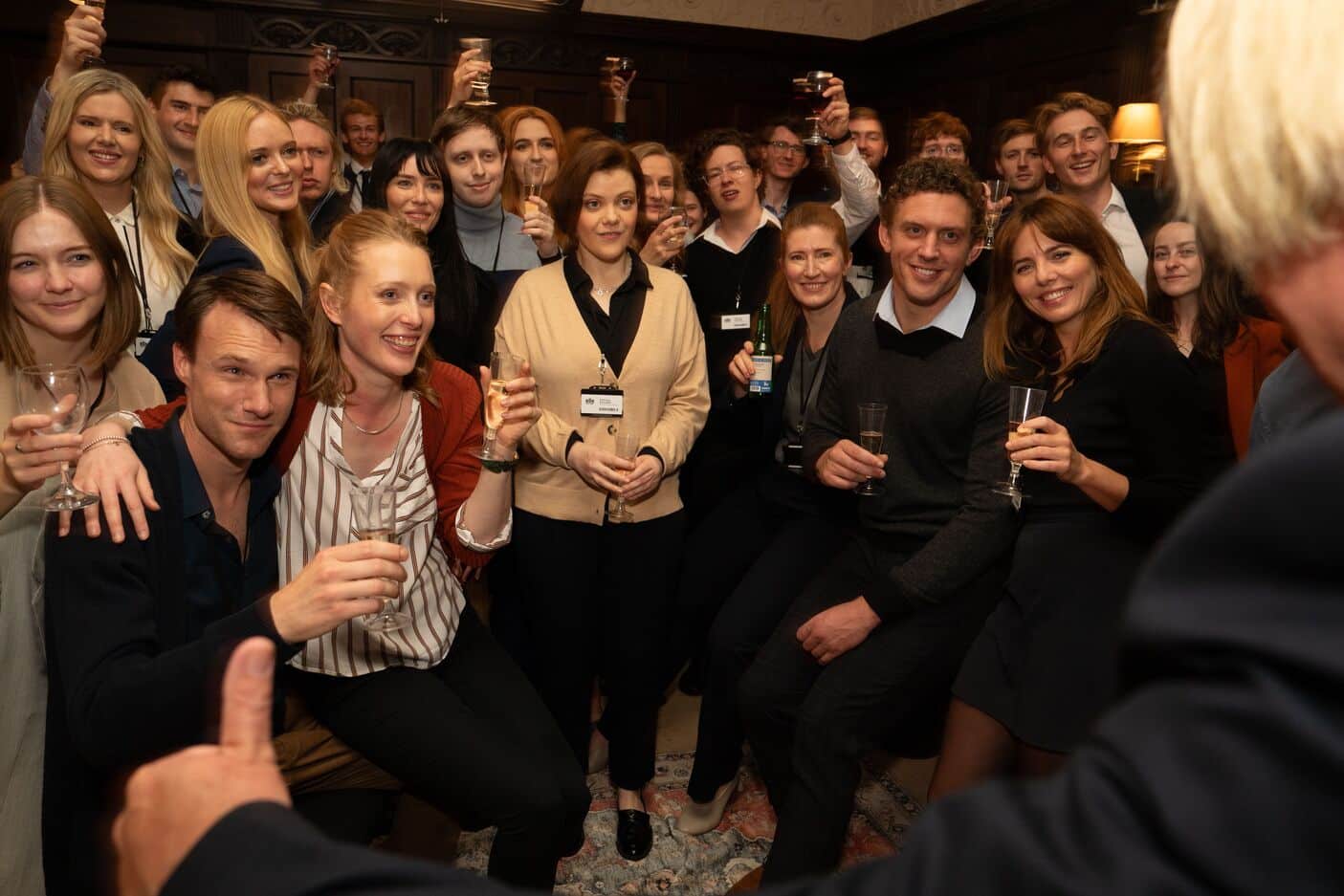
Even though it’s shocking, it is funny, in a horrible kind of way.
I think that contrast in tone is important. It also means that when you do have the documentary archival footage, it feels even more shocking. I think a lot of the time you are laughing at, not with them, you’re laughing in disbelief. That’s a very difficult thing to pull off. I think that Joe really got that right because, especially when it comes to every conversation that we have about Brexit. Everything that we’re talking about is pulled from actual stuff that the government was saying at the time. It’s funny but it’s not just us being like, ‘Oh, we need a comic moment’, but it has a slight satirical element to it, because it is and was ridiculous. But I do think that you need those dynamics in the tone. I think it’s important.
Have you been entirely put off by politics and politicians now after working on this? Because it is an indictment of these people in this very rarefied world.
I don’t know. I can’t remember if this is something that I read, but it’s that in politics, you’re never really voting for the best option, only the least worst option. It’s been a really long time for me, if ever, that I thought I was voting for the best option. It does always feel like the least worst, and that’s a shame.
But as much as it’s so easy to become disillusioned with the political sphere, it’s like we owe it to ourselves to not be disillusioned because we have to keep trying to hope for better and trying to create better. I think it goes without saying that I’m not someone who supports the Conservatives, and I never have been. The biggest part of being playing this character was trying to get my head around this hero worship for Boris. Of how you are Conservative after growing up in the north. There’s no perfect party, and I think there’s a lot of people who might say that anyone under those circumstances would have done what was done. I completely disagree. I do think that there is something inherent to Conservative values that leads you to do something like that. Such as prioritising the individual over the collective, and over community. Not having a capacity for social empathy that extends outside of your inner circle, which is maybe bound in a particular class. Also a hefty amount of privilege and the conveyor belt of privilege in terms of the schools that a lot of these people go to and then the universities, and the friends they have.
I hope that this show means people will see that party for what it is, what I believe it is, which is that I don’t think they care about people. This is a very good example of that.
Oh, I think they care about some people, and I think they care about themselves, but in terms of a wider sense of empathy and conscience and really wanting to have a better life for everyone, this is perfect example of how that’s not important to them at all.
You do come out of watching the show incensed.
I think that’s a good, healthy emotion. It’s quite rare that you see those kind of shows now, that do leave you stimulated in that way. Not just entertained, but actually annoyed. The stakes are high, and it really does mean something. I mean, there’s a reason why the show is broadcasting at the same time as the Tory Party Conference.
That is something that’s important. And it’s also that thing of we’ve been told, particularly about Partygate, that we have to move on and make the best of what happened and saying almost that we’re the problem because we’re not moving on from it. Actually no, if people haven’t been held properly accountable for something, then we don’t have to move on. I don’t want to be gaslit by our government into not caring about something that is really important and speaks volumes.
Also just look where we are now as well. The calamities haven’t stopped and the lack of integrity is still apparent, while many people are having a really hard time right now.
I think it’s very clear that it’s not an isolated thing that happened, it is indicative of those attitudes and what happens going forward.
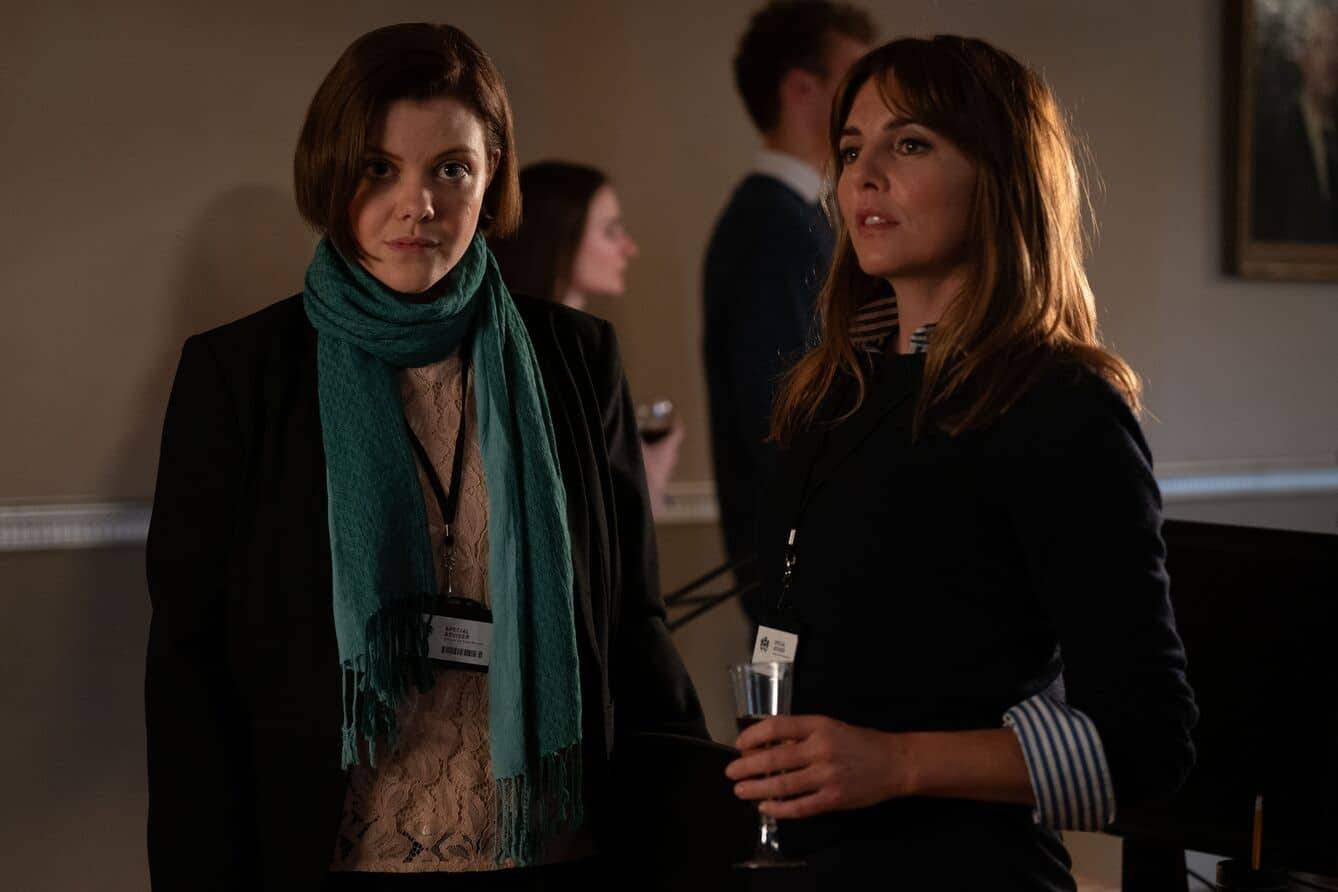
Is work kicking back in now with the strikes resolved?
At the moment, I’m still waiting for a show to kick in. I think the fact that it has been such a prolonged period of striking is good because I feel like it hopefully this is going to herald a real new era. Things have not been changed in the way that they should have for a very long time, and so it’s like we do genuinely have the chance for it to be a new chapter, and that’s very exciting. However, practically, it’s not an easy time. Freelancing is difficult, not having that security. So it has been a weird time, but I can only support it because I feel like hopefully there is going to be a healthy amount of justice and the start of something new.
Have you managed being an actor? You’ve been doing it since you were young.
You just have to make your peace with it. I definitely have busy times and then I have times where it’s not busy at all and it’s stressful. I think we need to talk more about the fact you have months where you’re just waiting for the right thing to come in and that’s really normal.
But I feel like acting, being involved in this industry, is my true love. Sometimes it feels like an ex-partner that won’t call you back. Sometimes you do end up feeling a little bit rejected by it and then when it’s good, there’s nothing like it.
I feel very lucky that, without exception, every single job I’ve ever done, I really loved doing. I’ve never done something where I haven’t enjoyed it and that’s lucky, actually. Sometimes I’ll be really heartbroken about not getting a job but maybe if I had got the job, I’d have got a month into it and realised that I was completely miscast. Then that would be its own set of stresses.
Don’t get me wrong, it’s taken me a while to get to this place. Definitely when I was in my early twenties, it was all just feast or famine, total euphoria or utter despair. Now I feel like I have a lot more perspective. I know I’m really lucky to still be working and to be working on stuff that I am really proud of. So many people never get to do this and I get to do it for a living, so that’s what I always have to remember.
Were your family all into acting when you were growing up?
No. I have two older sisters and the oldest sister, she’s seven years older than me and has always been a really incredibly talented performer, acting, singing, dancing, all that stuff. I think I had my own love for it, but I also did look at her doing it and was like, ‘Oh, my sister’s really cool and I want to do that too.’ But in terms of our family, my mum was a teacher, my dad was a consultant, it’s not in the family. And I think that increasingly very rare, to have no connections at all.
Nepo babies!
Yeah, I think that it’s really funny because the nepo baby discourse is so flawed because there are so many people who are in talented families where it makes total sense tha they would carry the torch. I know many people where that is the case, where they are in their own rights, incredibly talented people. However, there are some people who do ride on their parents’ coattails and it darkens the name of everyone else.
Growing up in Yorkshire, where there’s less exposure to the opportunities for auditions or anything like that. I am proud of myself that, I had to carve my own path and it wasn’t done for me. We do have a lot of dramatic people in my family so maybe that’s where I get it from.
Do your family bring you down to earth?
I do think there’s a grounding that happens particularly in the north where it actually comes from a place of real affection and real pride. Sometimes when people meet me, I think that they assume that I am going to be a certain way because I acted as a child and have been exposed to this world. I do consider myself to be quite normal and grounded because, to be honest, there wasn’t any other option! I think if I had ever got too high and mighty my parents would have just not allowed it. It’s important.
And I also am aware of the privilege in terms of I’m really lucky that I have sane, loving parents who weren’t just trying to turn me into like a cash cow. Which sometimes does happen for kind of younger performers who have to suddenly earn money for the family. It can be a lot of pressure to put on a kid. I’m really lucky that I never had that.
That’s like Partygate again, with these worlds that seem really hard to crack and very closed, and that seems to be happening in a lot of different industries where the elite circle the wagons when times get tough
I think that talent does prevail, but I think the percentage of times when it does is unfortunately getting smaller and smaller, and it shouldn’t be that way. We now have this huge push towards inclusivity and diversity that we’ve just been gagging for. Of course we need it. And it’s such an exciting time because you have all these fresh new voices and exciting stories rather than the same thing just being regurgitated over and over again.
You have that on one side and then on the other side, it feels like some areas of the industry are becoming this sinkhole about who you know.
I’m even thinking, what it would have been like for me? Obviously I was very lucky to get my first job when I was eight years old and that was such a mad experience that no one in my family had planned for. It really was one of those stories that you hear about of being plucked out of an open call. My drama teacher took me to it, it wasn’t even something that my parents were really aware of. I have my own journey in terms of the challenges, but also the triumphs of that. But I don’t know what my acting career would have been like if I had just tried to make it at 18. I don’t know, because I am from the North and I have been told before by casting directors that I’m not your typical cookie cutter beautiful actress or whatever. I am completely fine with that. I’ve made my peace with that. At the time, I used to be very insecure about it, but now I really have a level of self esteem that I didn’t used to have and real confidence in how I am and how I look. But it does make you think. I really don’t know if I was just starting out, if my talent would prevail in the same way because I didn’t know anyone.
It’s actually really similar to Grace in Partygate because one of the first questions she gets asked at one of the first parties is, ‘who do you know here?’ How did you get in here?’ ‘I don’t know anyone.’ And it’s such a massive shock: how did you get here if you don’t know anyone? And then more time that she spends these people you start hearing about this phrase ‘far back’, which I wasn’t even aware of, but apparently it’s absolutely a thing that exists and is about this lineage of generations of families who all knew each other.
It’s really easy to get down about it sometimes, but honestly- there is hope. I do believe that there’s hope.
Who’s a hero that you would love to work with?
For me, it’s always directors. I always have certain directors where, because I want to direct myself, I completely will get so fascinated with their whole filmography and I’ll get so obsessed. If it could be anyone, it would probably be Lynne Ramsay because I think that she is such a singular director. I love that she only has, I think, four films, and every single one of those films is a pearl and is completely realized and brilliant. She takes chances and she’s really uncompromising.
What do you hope people will get from Partygate?
I do hope that it makes people angry and I hope it makes people think about what they’re going to do in the polling booth. I want people to think that enough is enough, it’s just too much disrespect and to feel empowered that they maybe have the opportunity to change things.
Putting that to one side in terms of just watching the program, I hope that in a way, there can be something healing in the anger, and maybe it will at least bring people together for some kind of community. I don’t know if we’ve even had a lot of stuff shown on TV where people are even talking about their experiences in the pandemic and what that was like. So I want it to be healing, but most of all, I want it to be galvanising.
Partygate is on All 4 now. Follow Georgie on Instagram:
Trending

Join The Book of Man
Sign up to our daily newsletters to join the frontline of the revolution in masculinity.




